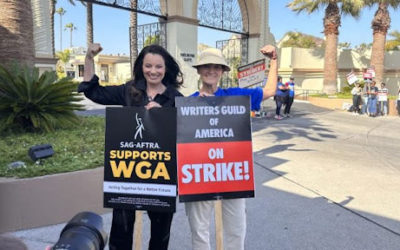Source: CNN
Awards season continues to move along throughout the film industry, and with the Academy Awards just over two weeks away, the level of excitement seems to only grow stronger as the date draws closer. Such excitement has in fact skyrocketed with some of the more recent lesser-known, but nonetheless just-as-meaningful awards ceremonies, the latest of which recently took place on the other side of the Atlantic Ocean. Held on Sunday, February 19th, the British Academy of Film and Television Arts (BAFTA) held its 76th annual British Academy Film Awards to commemorate the cinematic releases of 2022, taking place at the Royal Festival Hall in London’s Southbank Centre and handing out twenty-five competitive accolades over the duration of the event. While there are some categories designated specifically for films made in the United Kingdom (those being Outstanding British Film; Outstanding Debut by a British Writer, Director or Producer; Best British Short Animation; and Best British Short Film), most of the categories are open to most other cinematic works, allowing the BAFTAs to more or less serve as the British equivalent of the Oscars. As such, many have come to see the BAFTAs as a means of predicting how the Academy Awards will play out; if that continues to be the case, then the results of this year’s BAFTAs could have likely caused some to rethink their prior expectations.
Easily the biggest surprise of the ceremony was the dominance of one film in particular, a film that most had not expected to be that strong of a contender, or at least as strong as those that had previously been sweeping up many of the year’s previous film awards. That film is “All Quiet on the Western Front”, a German-language anti-war film based on Erich Maria Remarque’s 1929 novel of the same name. Though not the first cinematic adaptation of Remarque’s harrowing story (that title goes to an American version released in 1930 that managed to win the Best Picture Oscar for that year), it hasn’t been any less critically acclaimed, and such recognition has only grown with the most recent BAFTAs. Not only did the film take the prize for both Best Film and Best Film Not in the English Language, but director Edward Berger received accolades for Best Director and Best Adapted Screenplay (the latter he shared with Lesley Paterson and Ian Stokell), as did James Friend for Best Cinematography, Volker Bertelmann for Best Original Score, and Lars Ginsel, Frank Kruse, Viktor Prasil, and Markus Stemler for Best Sound. Altogether, “All Quiet on the Western Front” took home a total of seven BAFTAs from fourteen nominations overall, more than any other film nominated.
Two films, meanwhile, came in second with four wins each. The first of these was a film that actually hailed from the BAFTAs’ native United Kingdom, that being “The Banshees of Inisherin” from Irish director Martin McDonagh. Both of the supporting actor awards were given for performances in this film (specifically, Barry Keogan won Best Actor in a Supporting Role and Kerry Condon won Best Actress in a Supporting Role), McDonagh himself won the BAFTA for Best Original Screenplay, and the film as a whole was named Outstanding British Film. The second was “Elvis”, a music biopic of iconic singer Elvis Presley from director Baz Luhrmann. For the film, Austin Butler received a Best Actor in a Leading Role for his performance as the titular musician, while Nikki Barrett and Denise Chamian won for Best Casting, Catherine Martin won for Best Costume Design, and Jason Baird, Mark Coulier, Louise Coulston and Shane Thomas received the BAFTA for Best Make-Up & Hair.
Elsewhere throughout the ceremony, all of the other winning films managed to receive a single BAFTA each. Cate Blanchett won the award for Best Actress in a Leading Role for her performance in “Tar”; “Guillermo del Toro’s Pinocchio” was named Best Animated Film; “Navalny” was awarded with Best Documentary; “Everything Everywhere All at Once” was honored for Best Editing; “Babylon” was given the BAFTA for Best Production Design; “Avatar: The Way of Water” received the accolade for Best Special Visual Effects; Charlotte Wells was the recipient for Outstanding Debut by a British Writer, Director or Producer for writing and directing “Aftersun”. Finally, though she was not honored for any specific film, it was Emma Mackey who was given the EE Rising Star Award.
Perhaps the biggest shock of the event came not necessarily from what did win, but rather what didn’t win, or at the very least how much it didn’t win. Despite being a major powerhouse throughout many of the past awards, Daniel Kwan and Daniel Scheinert’s “Everything Everywhere All at Once” came up mostly empty-handed at the BAFTAs apart from the aforementioned Best Editing award. Kwan and Scheinert lost Best Director to Edward Berger for “All Quiet on the Western Front” and Best Original Screenplay to Martin McDonagh for “The Banshees of Inisherin”; Michelle Yeoh lost Best Actress in a Leading Role to Cate Blanchett for “Tar”; Ke Huy Quan lost Best Actor in a Supporting Role to Barry Keoghan for “The Banshees of Inisherin”. These are just some of the awards that “Everything Everywhere All at Once” failed to earn at the BAFTAs, with the most notable being its loss of Best Film to “All Quiet on the Western Front”.
With all that said, does this mean that there’s no chance for “Everything Everywhere All at Once” to win the Academy Award for Best Picture? Not necessarily, especially after Daniel Kwan and Daniel Scheinert won Outstanding Directing – Feature Film at the Directors Guild of American Awards, one of the more prominent of the guild-specific awards ceremonies, just as day earlier. Still, if the BAFTAs have proven anything, it’s that nothing is guaranteed when it comes to major film awards. Even if “All Quiet on the Western Front” and “The Banshees of Inisherin” haven’t quite knocked “Everything Everywhere All at Once” from its frontrunner spot, they have shown that its supposed eventual victory is far from guaranteed, and only time will tell if the Daniels’ absurdist comedy-drama will triumph in the end.




